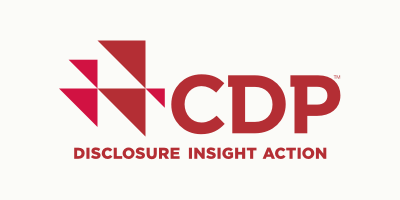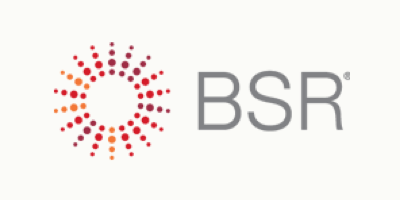
The Global Commons Alliance’s Accountability Accelerator (GCAAA) is a global collaborative of philanthropists and practitioners focused on creating a comprehensive accountability ecosystem for nature that scales and accelerates corporate action.

Vision
Safe and just future for people and planet.
Mission
To ensure companies are credibly and actively contributing to a nature positive and equitable world by 2030 and beyond. Driving action by strengthening the accountability architecture and supporting a tight web of accountability stakeholders, who are working globally to incentivize, enable, pressure, and hold corporations accountable for delivering on their nature commitments.

Explore the new Navigator
“The need for collective action on nature and climate has never been more urgent. The Navigator brings vital rigor and clarity for organizations grappling with complex climate and nature priorities as they contribute to a more resilient and regenerative future.” Natasha M. Matic, Ph.D.
The Accountability Accelerator aims to
- Strengthen and accelerate corporate accountability: Support, through participatory grant-making, organizations working on targets, frameworks, skills, resources, and pressures to push for credible action.
- Support the broader accountability ecosystem: Coordinate and support a tightly woven web of accountability actors, using various tools both in the Global South and North to drive action and push corporate action and accountability for nature.
- Influence governments to drive corporate action: Push governments to demonstrably provide the enabling environment for business & finance to halt and reverse nature loss.
Accountability Accelerator’s Main Functions
- Grant-maker: Participatory grant-maker providing funding support for global, early-stage, innovative accountability projects and actors.
- Orchestrator: Align stakeholders, strengthen accountability architecture, identify accountability gaps and opportunities, capture learnings and insights.
- Convener: Create a safe place to bring all the stakeholders together to learn from each other, think creatively, and spur action.
Approach
The challenges the Accountability Accelerator is setting out to solve are not new but they are complex. The accountability landscape for corporate sustainability is highly fragmented with many gaps in data and standards, lack of coordination, and disconnects between different actors working in different regions of the world.
Accountability is an ecosystem of actors and actions which includes incentives for companies to take the first steps towards a nature-positive economy as well as resources and ongoing support, and finally, putting pressure and holding companies accountable for their commitments and actions. The tighter and more coordinated the web, the less opportunities for inaction and greenwashing. Companies and governments have a crucial role to play and must be engaged in the process.
To achieve our mission, we believe all stakeholders must work together and be supported by a multi-layered accountability ecosystem or architecture with mutually reinforcing and complementary approaches that ensure accountability for all.
Stakeholders
Stakeholder engagement is one of the key ingredients for the Accountability Accelerator’s success.
Our stakeholder wheel illustrates the wider community of actors, especially from the Global South. The Accountability Accelerator engages with these stakeholders: as direct beneficiaries of grants, as partners, as agents of influence, or the agents of change that can catalyze corporate accountability.
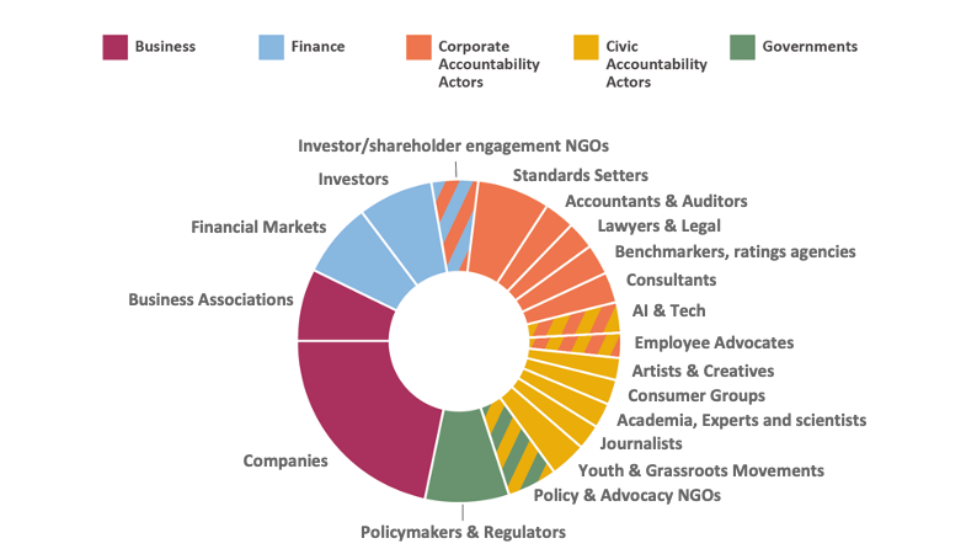
Accountability Loop
We can build an accounting system through strong collaboration, ratcheting up corporate commitments and engaging them on accountability. An infinity loop forms as corporate models, capital and regulation shift towards sustainable practices, thus building momentum and accelerating the cycle.
1) This process starts with companies understanding their impact and dependencies, planning where they need to focus their efforts on their material impacts, and acting on their targets to deliver operations in line with a safe and just economy. (Steps 1-4)
2) Successful companies track progress in a way that is verifiable and report so that other key accountability actors across the spectrum can monitor compliance and progress in a transparent and data-driven way. (Steps 5-7)
3) Finally, it is critical to elevate the work within the full loop by changing corporate behavior through rule change, better policies, market signals, and consumer demand, effectively shifting from voluntary to mandatory through regulation, fiduciary duty, and other normative structures. (Steps 8-10)
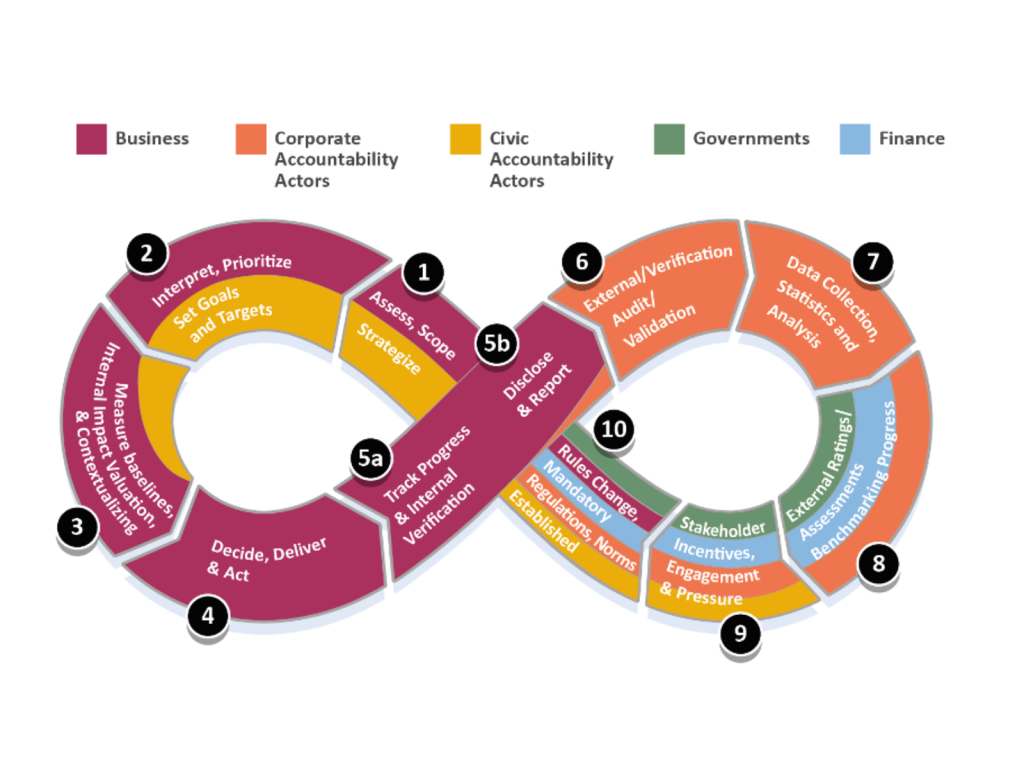
Programs
The Accountability Accelerator works across three Programs: Engagement Clusters (including grantmaking), Resource Delivery, and Target Validation.
Engagement Clusters
The Accountability Accelerator is engaging with corporate accountability actors and stakeholders through four primary levers, referred to as “clusters”:
- Data & Standards
Supporting organizations that are working on standards, frameworks, targets and benchmarks and ensuring that companies take action, assess, commit, transform, and disclose, on their commitments.
- Finance
Engaging, mobilizing, and enabling the finance sector to take action and optimally leverage its role towards a ‘Safe and Just” future for our planet and its people’. Support organizations by providing guidance, targets, methodologies, benchmarks, capacity building, and putting pressure on the financial sector.
- Legal
Reducing corporate actions that are harmful to nature and biodiversity by mandating disclosure, driving ambitious regulation, and enforcing existing legislation while supporting systems changes such as redefining fiduciary duty.
- Campaigns
Incentivising and supporting corporate action towards a nature-positive and equitable world. Increasing corporate accountability through enabling the power of local and global stakeholders. Supporting through grantmaking those working on awareness, youth activism, campaigns, journalism, citizen action, art, and elevating grass-roots efforts, especially in the Global South.
Grants
The Accountability Accelerator is currently funding early-stage projects and organizations that contribute to building an accountability architecture across the four clusters.
Current and past grantees include:
Data and standards
Finance
Legal
Campaigns
Grant Process
The Accountability Accelerator supports the development of a robust accountability ecosystem for corporate action on nature by making mid-sized grants (USD 50,000-100,000) to specific projects that fit with our areas of work. We specifically focus on closing gaps in the accountability landscape and on projects that are early-stage and require higher-risk seed funding that might be deemed too risky by larger funders. The Accountability Accelerator works with applicants to co-develop proposals and accepts proposals on a rolling basis. We pride ourselves in our ability to be reactive and nimble to catch and support urgent and time-sensitive projects.
We support a broad range of projects across different dimensions:
- Structural (top-down) as well as scalable grassroots (bottom-up),
- Enabling environment and incentives (carrots) as well as pressures and pushes (sticks)
- Projects that focus on rule change (mandatory) as well as culture (voluntary)
Finally, the Accountability Accelerator recognizes and supports the rights and leadership roles of Indigenous Peoples and local communities as stewards of nature and the vast majority of the world’s biodiversity regions. We endeavor to have at least half our grants going to the Global South, where the impacts of global agricultural, manufacturing, and commodity supply chains are most deeply felt on the ground.
Grant Criteria
The Accountability Accelerator evaluates grant applications based on a range of criteria. These include the following:
- Proposal is aligned with the priorities of the Accountability Accelerator and benefits from the work of the Accelerator
- Contributes to systems change in Accountability through scalable or replicable models
- Proposal addresses a gap in the corporate accountability work and is complementary / partners with other initiatives
- Urgency of funding need and ability to secure other funds elsewhere if we kick-start it
- Is this a project that specifically needs Accountability Accelerator support, noting a preference for true start-up projects
- How the organization will capture and share learnings
Resource Delivery
The Accountability Accelerator has engaged with partners to produce several specific resources to enable and grow the accountability ecosystem.
The accountability landscape for corporate commitments related to nature is fragmented with many gaps when it comes to data and standards, finance, legal and campaign efforts and disconnects between different and fragmented actors in the space. This leaves key stakeholders – from advocacy NGOs to investors, lawyers, and grassroots organizations – without information to understand corporate actions and nature crimes and hold them to account for their commitments and actions. To address this, the Accountability Accelerator has undertaken a comprehensive mapping of the nature-focused corporate accountability ecosystem. The result is a global, interactive, visual mapping tool designed to bring transparency and connection to the accountability ecosystem, identifying future grantees as well as gaps to be filled. This work is being expanded with deep dives focused on three global biodiversity hotspots: Amazonia, Southern Africa and the Congo Basin, and South East Asia.
- Nature and Climate Navigation Resource for Companies and Financial Institutions
A resource to orient companies and financial institutions within the landscape of business guidance, management tools, methodologies, and disclosure frameworks that address nature and climate action and transparency.
Target Validation
The Science Based Targets Network (SBTN) has appointed the Accountability Accelerator to host target validation services for its corporate science-based targets for nature. The validation services are expected to launch later this year. Learn more here.
The GCAAA team

Natasha M. Matic, Ph.D.

Natasha M. Matic, Ph.D.
Natasha joined the GCA Accountability Accelerator in early 2022 as the Executive Director to work on strengthening accountability architecture around corporate action on nature. This requires mobilizing funders and ensuring participatory grant support to organizations working on corporate accountability. Natasha spent most of her career working in the Global South and the emerging markets and has twenty-five years of experience in philanthropy, sustainability, and systems change. Previously, Natasha served as the Deputy CEO and Chief Strategy Officer at the King Khalid Foundation (KKF), a leading philanthropic institution in the MENA region, working on building the local civil society ecosystem and strengthening corporate ESG practices. Natasha started her career working on establishing microfinance banks in several Global South countries. Natasha holds a Ph.D. in Economic and Political Studies from Boston University, a Business Excellence degree from Columbia Business School, and a Law Degree from the University of Belgrade’s Law School. She is a Member of MIT Legatum Center for Social Entrepreneurship’s Advisory Group, AccountAbility’s Sustainability Standards Board, and Foundation20’s Steering Committee. Natasha resides in Washington, DC.

Randall Krantz

Randall Krantz
Randall joined the Global Commons Alliance in its infancy and helped design its initial governance. Early conversations with funders and partners made it clear that the GCA would need the tools and allies to ensure that companies act on their commitments to Nature. From this, the seeds of the Accountability Accelerator were planted in 2019. Since starting his career in the energy sector, Randall has been building business partnerships for a variety of sustainability interests over the past 15 years. While at the World Economic Forum, Randall helped start their work with the private sector on climate change in 2005 and, subsequently, their initiatives on sustainable consumption and circular economy. Subsequently, Randall has helped convene mayors at COP21, build a multi-stakeholder decarbonization initiative for the Global Maritime Forum, and shape a new narrative for Nature with the UN Development Program. Randall studied Mechanical Engineering and has an MBA from IESE Business School, and resides with his family in Geneva, Switzerland.

Natasha Tariq

Natasha Tariq
Natasha joined the Global Commons Alliance in October 2023. She has over 25 yearsexperience working in Asia and the Global South. Natasha’s in-depth knowledge of Asia and its development over the last few decades has resulted in her successfully building partnerships across different sectors and regions. Previously Natasha led Synergos’s work in the region where she formed their Climate Collaborative, a global group with the purpose of creating a community around effective climate action, bringing together philanthropic leaders to elevate successful action at a local level, share knowledge of best practices and participatory initiatives and explore how they might be shared and adapted in different parts of the world. She has consulted for the IFC World Bank and an Asian-based consulting firm, in these roles, she has worked closely with the private, public, and NGO sectors on Asia-focused projects. Prior to which she was in the private sector at a boutique investment bank, UBS AG, and Sloane Robinson, a hedge Fund in London covering Asia and the emerging markets. She holds a MA in International Relations and a BA in History from the University of London SOAS and is currently based in Hong Kong.

Mariana Cascardo Michael

Mariana Cascardo Michael
Mariana has been the coordinator for the Global Commons Alliance Accountability Accelerator (GCAAA) since early 2023, where she contributes her expertise and passion for driving positive change on a global scale. She is a Brazilian with a bachelor’s in Architecture and Urban Planning from the Federal University of Rio de Janeiro (UFRJ) who has always focused on efficiency and sustainable development. It was during her master’s in Resource Efficiency in Architecture and Planning from the HafenCity University (HCU) in Hamburg that she embraced her dedication to nature conservation, climate change mitigation, and the pursuit of social equality. She currently resides in Hamburg, Germany.

Miriam Van Gool

Miriam Van Gool
Miriam has joined the Glocal Commons Alliance since early 2023, combining work for both the Accountability Accelerator and the Science-Based Targets Network (SBTN) and focusing on engagement of the financial sector. With a degree in Biology and over 25 years of experience in conservation and sustainability (starting with about 10 years working for WWF), her network encompasses both scientists and NGOs, and those working on sustainability in the public and private sectors. From 2010 until 2013, Miriam was based in Dakar, Senegal, working for the development bank IFC (part of the World Bank Group) in Sub-Sahara Africa on Sustainable Business Advisory. After returning to her home base in Utrecht, the Netherlands, she increasingly works on the interface of the financial sector and sustainability. At the Accountability Accelerator, she is keen to both support the financial sector to take nature into account, and hold financial institutions accountable.

Dean Cambridge

Dean Cambridge
Dean Cambridge has spent his career redefining ‘business as usual’ by guiding companies, governments, and NGOs to accelerate the transition to a just and sustainable world. Dean has previously mobilised business engagement in the Science-Based Target Network process and understands what it takes to hold companies to account for ambitious target setting and delivering action to turn those commitments into real-world impact
As part of the executive team at Chapter Zero, the Directors’ Climate Forum, he focused on shaping the boardroom agenda, embedding climate and nature action into the core of business strategy. As Director of Corporate Net Zero at the We Mean Business Coalition, he orchestrated collaboration between global non-profit initiatives that set the standard for net zero emissions and nature-based approaches. Dean brings a legacy of partnerships and advocacy while at WWF, inspiring action and forging alliances to accelerate positive impact for people and the planet.

Seema Joshi

Seema Joshi
Seema Joshi is the Legal Strategy Director at the GCA Accountability Accelerator. Seema has 25 years of experience working on corporate accountability from the legal, human rights, environment, and climate perspectives. Previously, Seema held director-level positions at leading not-for-profit organizations, including overseeing Stand.earth’s Fashion and IT campaign, running Amnesty International’s global Business and Human Rights work, and driving six climate campaigns while at Global Witness. In these capacities, she led teams and created cutting-edge strategies relating to a just energy transition, supply chains, environmental justice and corporate crimes. Seema also worked on regional environmental governance for the United Nations based in Bangkok and practiced as a lawyer in Canada. She holds a Master’s in International Law, Bachelor of Laws (JD equivalent), and Bachelor of Arts, as well as various board and advisory level positions.
The Accelerator’s Legal cluster focuses on reducing corporate actions that are harmful to nature and biodiversity by mandating disclosure, driving ambitious regulation, enforcing existing legislation, and supporting systems change through transformational shifts such as redefining fiduciary duty.
Governance
GCAAA Impact Advisory Council (IAC)

Caroline Bryant

Caroline Bryant
Coming soon
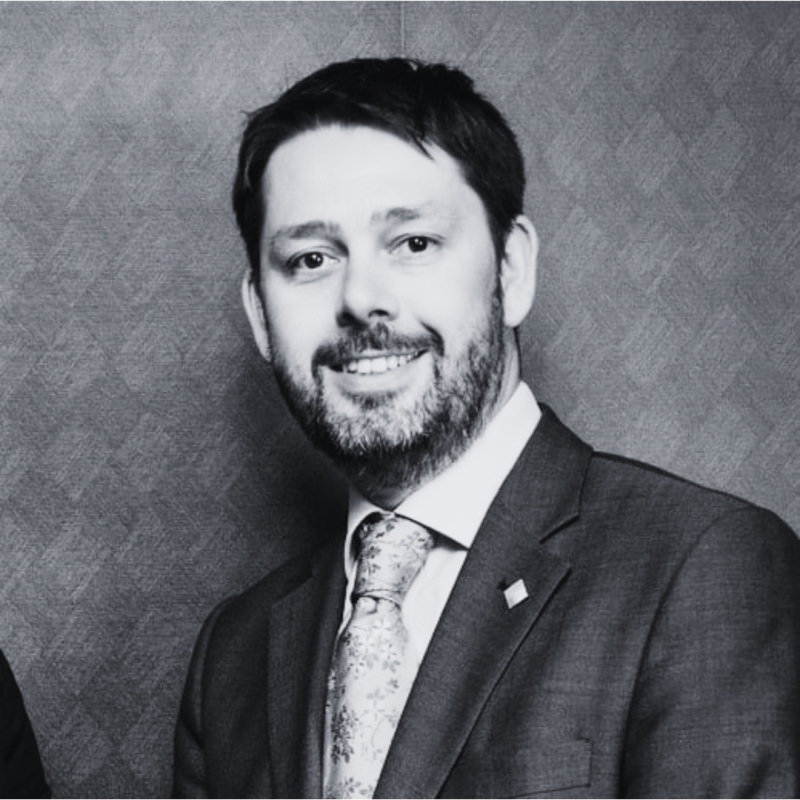
Mark Gough

Mark Gough
Coming soon

Cate Lamb

Cate Lamb
Coming soon

Eva Zabey

Eva Zabey
Coming soon

Gerbrand Haverkamp

Gerbrand Haverkamp
Coming soon
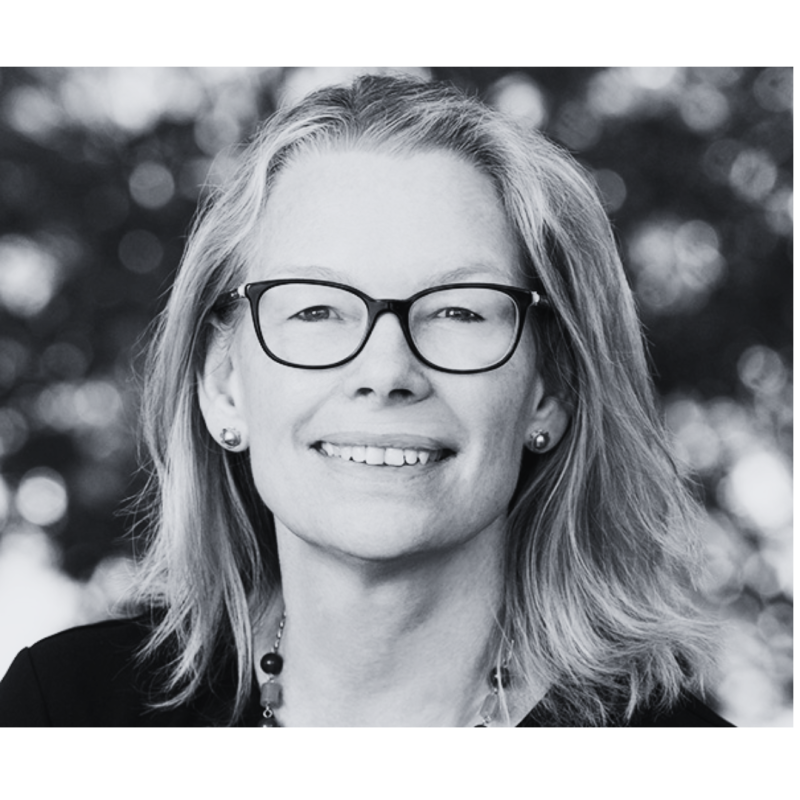
Heather Grady

Heather Grady
Coming soon

Natalie Nicholles

Natalie Nicholles
Coming soon

Greg Hilditch

Greg Hilditch
Coming soon

Shishusri Pradhan

Shishusri Pradhan
Coming soon

Komala Ramachandra

Komala Ramachandra
Coming soon
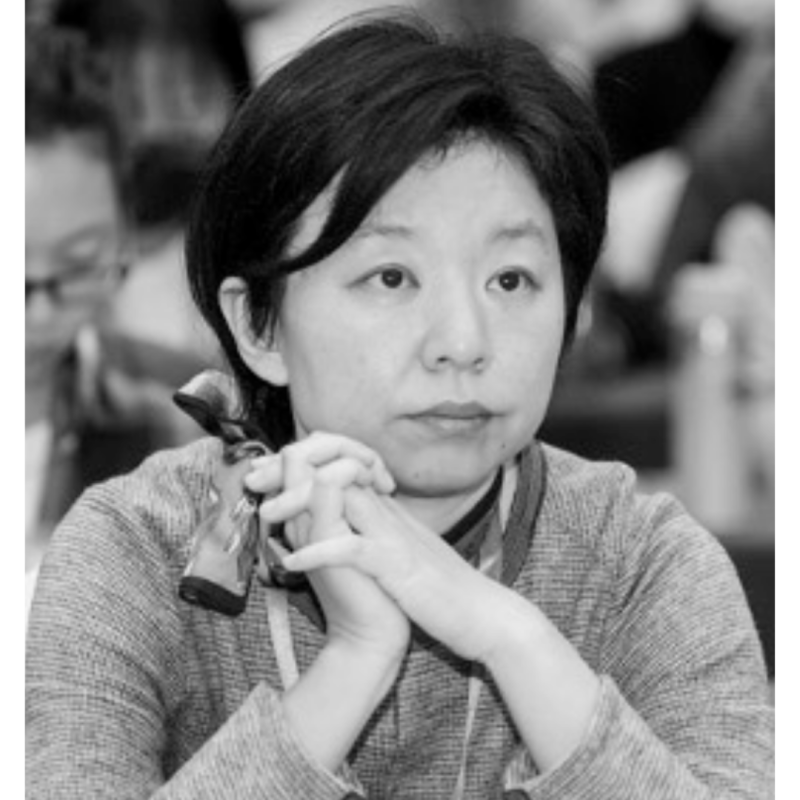
Bowen Zhang

Bowen Zhang
Coming soon

Join the GCAAA network
Connect with Global Commons Alliance's Accountability Accelerator on Linkedin



